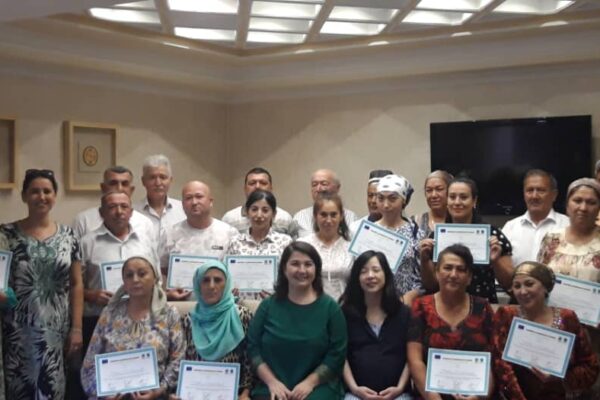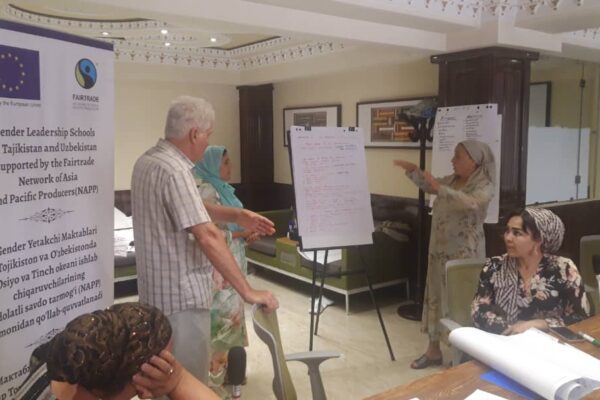“You are leaders inspiring other women producers to enhance their participation in the management of their communities, organizations and households.”– Sonia Dominica, Fairtrade International’s Specialist on Gender and Social Issues.
Gender leadership initiatives play a pivotal role in dismantling traditional biases and fostering inclusivity. By promoting equal representation at the decision-making table, these initiatives harness diverse perspectives and insights, driving innovation and balanced governance. Ultimately, they pave the way for a more equitable and progressive society by empowering individuals, irrespective of gender, to contribute their talents and shape the future. Recognizing its significance, initiatives focused on gender leadership have been introduced for farmers in Tajikistan and Uzbekistan. Co-funded by European Union, a comprehensive 4-day training of trainers (ToT) program was held from August 1st to August 4th for the farmers of small producer organizations “Turob-Bobo” in Uzbekistan and “Bio-Kishovars” in Tajikistan. This event marked the 3rd cycle of GLS ToT, with modules 1 to 3 taking place in November 2022, followed by modules 4 to 7 in February 2023. The final round concluded with the final three modules (8-9-10).
 The official conclusion of the final round of the Gender Leadership School for farmers hailing from Tajikistan and Uzbekistan took place at Dushanbe’s Atlas Hotel on August 7, 2023. A significant milestone in promoting gender leadership in the region, this initiative was developed by Fairtrade NAPP and funded by the European Union.
The official conclusion of the final round of the Gender Leadership School for farmers hailing from Tajikistan and Uzbekistan took place at Dushanbe’s Atlas Hotel on August 7, 2023. A significant milestone in promoting gender leadership in the region, this initiative was developed by Fairtrade NAPP and funded by the European Union.
The official closing ceremony was attended by representatives of Fairtrade International, a representative of the local authorities of the Sughd Region and the USAID Agricultural and Land Governance Project. A total of over 25 participants participated in the final round of the training. The main objective of the Gender Leadership School in Tajikistan and Uzbekistan is to empower the capabilities of female producers and workers by strengthening their capacities including leadership skills. The school primarily targets Fairtrade-certified women producers with an aim to elevate their involvement in community, organizational, and household leadership and management.
Throughout the final three modules, participants were tasked with applying their acquired knowledge and field experience in agriculture to formulate comprehensive business projects to serve as community leaders. The 8th module of the Gender Leadership program focused on the meticulous selection, planning, and management of income diversification and social impact initiatives for producers and workers, catering to varying levels of literacy and interest. The central point of the projects was the goal of aiding marginalized farming families, with a dual emphasis on educating women and girls in both agricultural leadership and entrepreneurship following their training.
Modules 9 and 10 delved into developing successful negotiation strategies and understanding the link between masculinity and gender equality. Recognizing the significance, participants noted the importance of future community leaders by acknowledging their pivotal role in project implementation and fostering equitable conditions. Module 9 witnessed participants improve their negotiation skills, especially in comprehending the nuances of effective negotiation timing and techniques. Through role-playing, trainers assessed personal negotiation styles, values, and their potential impact on successful outcomes. Module 10 focused on addressing “masculinities” (men’s attitudes and roles) within initiatives aimed at bolstering women’s leadership in organizations and communities. This module emphasized involving men to enhance women’s influence across workplaces, households, and broader society.

Participants reached a unanimous consensus upon concluding the three modules to the most effective way to realize gender is to support and involve men in gender activities. While acknowledging that any expression of “masculine” behaviour contributes to the advancement of women and girls, the training emphasized the support of fathers, brothers, and husbands in guaranteeing to achieve success in gender-focused social projects.
The training sessions were conducted in a dynamic and encouraging atmosphere to enhance the commitment of our skilled trainers and the enthusiastic involvement of our participants in the GLS program. Their unanimous feedback emphasized the significance of each module, especially for the clarity and accessibility of the trainers. The diverse instructional elements, including videos, presentations, handouts, and energizers, played a pivotal role in reshaping their perceptions of women’s societal roles. We are deeply grateful for the trainers’ dedication and the generous support from our donors, which enabled the establishment of Gender Leadership schools and the empowerment of women across their communities. This marks not only the conclusion of this training phase but also the beginning of a journey towards greater gender equality and inclusive leadership.
Testimonials:
“We all understand that everyone has rights. We need to stop violence within families. Parents should really focus on their daughters’ education and jobs. I hope to see equal rights for men and women in businesses and groups.” – Mirzoev J.- farmer of SPO Bio-Kishovarz, Tajikistan
“As for a mother of 3 daughters the Gender Leadership School has inspired me to empower and support my daughters, sisters, neighbors to have the confidence to make their own decisions in their lives. Every woman should know about her rights and be independent.Every woman can be a leader in her community and for this it is necessary to be educated in finance and economy sphere. Gender leadership school in Tajikistan and Uzbekistan give us this opportunity. I am ready to learn an share my experience with our ToT team ” – Mrs. Valieva Gulbahor, farmer, Bio-Kishovarz,Tajikistan.








